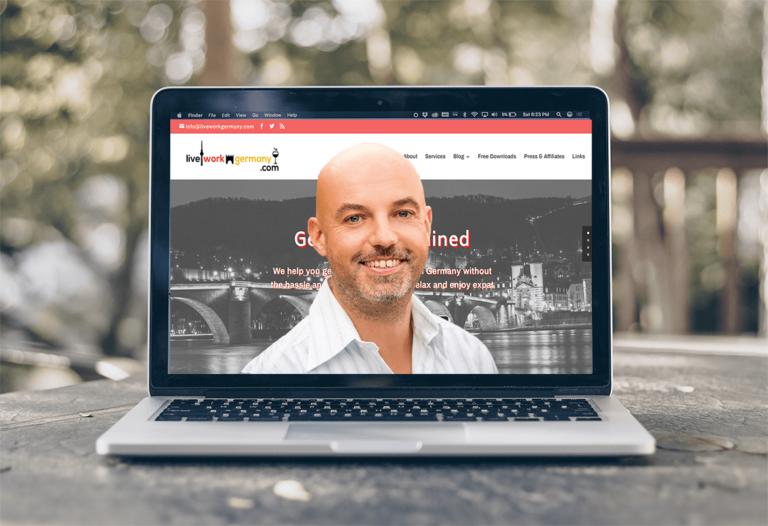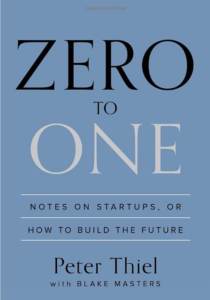How to start your own business as an expat & master the german corporate world
An interview with James, the founder of liveworkgermany.com
The Expat community is a really open-minded and supporting community. Everyone knows how it is to start fresh and be a foreigner at some point. I really like the fact that we share a common ground although we are coming from different countries and have different backgrounds.
Lately, I talked to many people in the community directly. Most of them I have never met in person but we speak over skype or phone and after each call, I always felt enriched, inspired and vindicated. These conversations gave me strengths and opened my horizon at the same time. The things you hear are familiar but at the same time refreshing.
I decided to share some of the conversations I have with other Expat and Expat Partners on this website in the hope that they will also inspire you and resonate with you.

How to start your own business as an expat
So let’s start with the first interview I did. Untypically for sharethelove, it was neither with a woman nor with an Expat Partner. It was quite the opposite. I was talking to James, who was born in the UK but is living and working in Germany for almost 12 years now.
James is giving advice and offering services to people around the world who want to live and work in Germany on his website https://liveworkgermany.com. After that much time in Germany, he is able to advise others who are newly arrived in Germany. From basic questions on how to find an apartment to more complex topics like doing your taxes, James has been there and can tell you first hand how to feel at home in Germany.
I found James on the web searching for other Expat-preneurs. Curious about what it takes to start your own business while being an Expat I virtually met James and loved how professional his website is and how much useful information and experiences he gathered over time to help others who are in a similar position today than him 12 years earlier.

James Meads - founder of liveworkgermany.com
Native Brit, born and raised in the Birmingham area.
Moved to Wiesbaden, Germany in 2006 for a career opportunity. Since then he became fluent in German and figured out how to start his own freelance business and, most importantly, learned what makes Germans tick
Let's learn more about James, his motivation behind his website, his view on the uk vs. German culture and how to adopt to a foreign work place
if you are thinking about starting your own business as an expat or if you want to learn more on how to become more familiar with a foreign work surrounding this interview will be particularly interesting to you.
What was your motivation behind starting liveworkgermany.com?
I really don’t like the winter here and I'd like to live somewhere warmer from November to March. The thing that first got me going was a book called Zero to One by Peter Thiel. This book first got me interested in starting my own business. It was about the same time that I bought a holiday home in Spain, just under two years ago. I was just moving stuff in and putting furniture together in this new holiday home that I bought and during this time I read this book and then another book by a guy called Pat Flynn. He's a very well-known podcaster on blogging and online entrepreneurship. That book, Will it Fl , essentially walks you through different steps to look at whether a business idea is viable and how to come up with the ideas or thoughts on what type of business to start. As I read through that book I started thinking about what kind of field I am an Expert in other than in my career as a purchasing manager. I thought, well, I know quite a lot about expat life in Germany because I've lived here for 11 years. I've done a lot of stuff that many expats that only come here for two or three years don't do. I speak fluent German and I know how to research stuff on German websites if I needed to. So, then I thought it would be cool to write a book about Germany made simple for expats. And then when I looked into that a little bit more, I thought, well that's fine. I know enough to be able to write a book. But then who was going to buy it? Nobody knows who I am. I don't have a platform, I don't have an audience. And then on the 2,000 km driving back from Spain I just binge listened to podcasts on online marketing and blogging and sort of figured out my next steps: To be able to write this book I need to have a website and to get traffic to the website I need to write articles and to write articles then I need to have some sort of blog theme or platform. And then I figured out what wordpress was, how to set up hosting. In November 2016 I put my first couple of blog posts online. It was January last year when I figured out how to install google analytics and get traffic statistics and see how I'm ranking. And ever since then, I've published one blog post each week.
Is being location independent a motivation for you?
Yeah, I'd like to be in a position where I could essentially live and work from wherever and have this as an online source of income. And not necessarily my hundred percent main source of income, but if I could do this together with a little bit of consulting here and there to pay the bills, that would be ideal. I've also seen how my parents haven't really been able to enjoy their retirement so there is a personal experience or drive there too. It just made me think that I would like to take off for three months every now and then without having to worry about my job.
What have been your biggest struggles when moving to Germany for work and how are you dealing with them almost 12 years later?
It sounds like a stupid one, but the biggest struggle for me is punctuality. I would be late for my own funeral. And Germans hate that- it's something that Germans hold in really high regard, but I'm just awful. I'm the guy that gets to the airport 40 minutes before his flight and then runs through the terminal. I would set my watch 10 minutes earlier to be on time for meetings. The other thing I've found tough in terms of work or professional environment is that if you've got any concept or a new idea or if you want to implement any change I find Germans generally to be quite pessimistic and quite negative. It's a "glass is half empty" mentality rather than the enthusiasm that especially Americans have. I guess you've seen it up close and personal now. So that's definitely a struggle: The resistance to change in general. I find Germans to be very, very cautious and very risk-averse and any type of change just seems to be viewed very suspiciously to me. Even just the amount of people that still bank with Sparkasse because they have done so since they were kids it's crazy to me. Why would you pay for a bank account that has such an awful service? They close at lunchtime. They're not open on Saturday and their app is terrible, but people are still very loyal customers.
What are important steps to take to become more comfortable in a foreign work environment?
The first thing that I would say is to learn the language. It sounds obvious, but so many people, especially Brits and Americans, just don't bother. I mean, I can understand that if they are here with the military or just here on a one-year assignment, but if people are coming over with a view to maybe settle here or stay here for more than 12 months, I just don't understand why people don't bother learning the language. Yes, it's hard, but life is hard. It's not an excuse to give up or not bother because it’s not easy. Being able to speak German, will just get you so much further in terms of your experience and what you get from your time here. It sounds so obvious that I almost feel stupid saying it but I see so many people who don't learn the language and they don't really get the same expat experience. The other thing when living abroad is whichever country you go to, you have to just expect and accept that some things are going to be better and some things are going to be worse, and you can't really change that. You can lessen the damage of certain aspects which are worse by trying not to put yourself in certain situations. You can try learning the language or do things that help you to integrate easier. But ultimately you have to just accept that some things work better or worse, but most of that you can't change. There's no point complaining about it so just enjoy the ride. If you really don't like it and you think that it’s unbearable, then there's always a plane home if you can't cope. Finally, when you are new and you don't know anyone you just have to try harder to socialise. I know this is hard for people that are more introverted and shy, but just join expat meet up groups for example. Go to things like internations.org or coffee mornings or mom and kid meetups and that type of thing. Because if you don't then you're not going to meet new people and you will just sit at home skyping with your friends and family back home and feeling homesick. It is so much easier now than it used to be when I moved here in 2006. Back then, there was no Facebook, there was no Internations, or even Tinder if you’re looking for a date. There was none of that. There were a couple of expat forums and there was the internet but nowhere near as many options as there are now.
What advice would you give Expat Partners who joined their partner on his career adventure abroad? What is the best way of finding a new job in an unfamiliar country?
I think if you are in an international hub somewhere like Chicago or in Germany, Berlin, Frankfurt or Munich then it's not impossible to find work. Yes, it's difficult if you don't speak the language, but if you have a specialized skill that you can think you can do, then it's really just about reaching out and maybe getting some coaching and make sure that your CV and your job applications are written in the format and apply to the cultural norms for the country you are living in. I accept that there are some obstacles to working abroad if your qualifications are not recognized in the country you're living in. If you are a lawyer for example it can be pretty difficult to practice law in another country. However, if you are in a profession that is fairly generic and can be done in most countries it's really just understanding the local job market and application process. If everything else fails then perhaps look at working freelance. Location independent jobs are on the rise as we are talking about more virtual working. There are a lot of different ways that you can earn money outside of your regular nine to five career path that you maybe would have stayed on in your home country.
Location independent jobs are on the rise. Yes, that’s definitely true and I will look into that topic in the near future. I hope you find that interview inspiring.
For me, it was really fascinating to see the whole topic from another perspective. It is always funny to see what other people are seeing in your own culture and how they succeed in their mission abroad. Check out James’s website https://liveworkgermany.com if you want to know more about him and the life in Germany.
It was great to virtually meet you James and I wish you all the best! Thanks for taking the time to present your view on cultural diversity and working abroad!
Books James mentioned
Thanks for stopping by and sharing the love

Share the article with a friend
Thank you!!!

Career Success for Expats: Unlocking Career Success After Moving Abroad
Moving to a new country for work can be both challenging and rewarding. A recent academic study titled „Exploring the Determinants of Career Success After Expatriation: A Focus on Job Fit, Career Adaptability, and Expatriate Type“ sheds light on the factors that influence career success for expats. I have summarized some of the key learnings from this study in today’s post. Here’s what you need to know if you’re planning an international career or moving countries to advance your career.

Are You Moving Abroad and Need to Update Your Resume for the US Job Market?
This article guides expats in adapting their resumes for the US job market, highlighting key differences from German resumes. It covers essential adjustments such as omitting personal information, emphasizing achievements, and using concise summaries. Additionally, it underscores the importance of reflecting on career goals and integrating international experience.

Finding Peace in Limbo: Thriving While Waiting for Your Work Permit as the accompanying spouse
Waiting for a work visa can feel like an endless rollercoaster of emotions. The uncertainty and impatience can be overwhelming, especially when you’re unsure if a work permit will ever materialize. However, this limbo phase can also be an invaluable opportunity for personal and professional growth.

Why Couple Contracting is Crucial for Expat Couples
Living abroad brings unique challenges that can shift dynamics within a relationship unexpectedly. From adjusting to a new culture to managing career changes or redefined roles due to local constraints, these transitions can strain a partnership without clear communication and agreed-upon expectations. It might sound wired to formulate a contract with a loved one. However, many appreciate this tool since it supports be more clear and active in our way of communicating with our partner. Let’s get started and learn more about what couple contracts entail and how to set one up for yourself. Further down I am also sharing a free template with you to get the process started.

Female Expats and Their Perspectives on International Assignments
Female Expats and Their Perspectives on International Assignments Text by: Kate von Knobloch The distribution of genders in international assignments reveals that parity is still

Career planning for expatriate partners involves navigating unique challenges and opportunities
Career planning for expatriate partners involves navigating unique challenges and opportunities.


